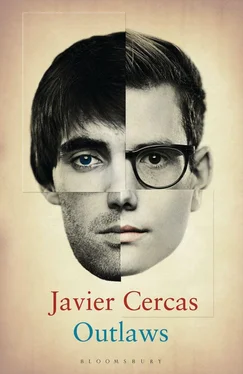‘In other words you were working towards Gamallo’s rehabilitation without believing that Gamallo could be rehabilitated.’
‘Exactly. But I didn’t try to deceive anybody. I told Prada from the beginning and the people at Correctional Institutions. And I repeated it to Cañas that afternoon, in my office: I did not believe Gamallo could be rehabilitated. And much less did I believe he could be rehabilitated in that way. To begin with, transferring him to Gerona had been a mistake: at that time Zarco was still a persona in Catalonia, not to mention in a city like Gerona, where he still had family and friends, although almost none of them had anything to do with him any more; whereas, in some distant prison in Castilla or Galicia or Extremedura, in the middle of nowhere, Zarco was no longer known, his myth was practically non-existent or it had faded and that was good for Gamallo, because until Zarco was nobody Gamallo couldn’t be anybody, or rather, because Gamallo could only survive if Zarco died. I’m not sure if I’ve explained myself.’
‘Perfectly.’
‘On the other hand, in the prison itself we did nothing but nourish that myth by not treating Gamallo like just another inmate and by granting him privileges. Those privileges were counterproductive, because Gerona Prison, like all prisons, was ruled by two laws: one was imposed by the superintendent and the other was imposed by the inmates; and I could tolerate the privileges, though they seemed wrong to me, but the inmates could not. I’ll say more: privileges are bad for prison life, because they provoke the ill-will of those who do not enjoy them, but they’re even worse for getting out, because they led people to believe that Gamallo was a special inmate and not a regular inmate like all the rest, and thus continued to fuel the legend of Zarco. Anyway: that’s more or less what I said to Cañas.’
‘And what did Cañas say to you?’
‘That’s when I was surprised. You know? I think to be a good lawyer you have to be a bit cynical, because a lawyer has the obligation to defend thieves and murderers, and on top of that, naturally, he’ll be pleased when thieves and murderers are not convicted. Justice is based on this injustice: even the worst of men has the right to have someone defend him; if not, there is no justice. This might seem disagreeable to you, and it is, but the truth is almost never agreeable. Anyway, I had Cañas down as a good lawyer, as I said, so I was sure that, in public, he would be airing the legend of Gamallo as a victim of society, the tear-jerking myth of the good, repentant thief and all that: after all, it was the best way to defend him in court; but I was also sure — that’s why I’d summoned him to my office — that deep down Cañas knew that Gamallo was not a victim of society nor a rebel from a movie but a complete bully, an unredeemable savage, and that, in private, speaking one on one to someone like me (who knew that he knew), he’d admit the truth or at least act as if he recognized it, and we could come to an understanding and spare ourselves some problems.
‘I was mistaken. The first thing Cañas said when he stopped listening to my explanations was: I’d like to know why you’ve told me all this. He’d left the stapled pages beside him, was sitting on the edge of the sofa and had his elbows resting on his knees, but he still had his fingers laced together. I told you, I answered. I think it’s my duty. I also think that, if we’re going to work together on this, it’s best if I lay my cards on the table and we come to an agreement. The lawyer murmured: I understand. But he didn’t ask me what I wanted us to come to an agreement on, and what he said after a pause made me think he didn’t understand. Tell me, Superintendent, he began. How many times have you and I been in this office, talking about one of my clients? Although I saw where the question was aimed, I didn’t dodge it. None, as far as I recall, I said; but then I added: It didn’t seem necessary. However, now it does seem necessary to me, just as it has before with some of your colleagues. This last bit was true, but Cañas nodded with a smile of magnanimous scepticism. It’s a first for me, he said. And I’ve been coming to this prison every week for almost fifteen years. Which could mean something, don’t you think? He answered his own question: What it means is that, no matter what you say, Gamallo is not a normal inmate. He paused, unlaced his fingers, raised his elbows off his knees and straightened up to look me in the face. Look, he went on, in a different tone, I’m grateful you had me come here, and I’m especially grateful for your frankness; let me be frank with you too. Whether you like it or not, Gamallo is a special inmate, and it’s logical that he’s treated as a special inmate. But his being a special inmate doesn’t mean that he can’t be rehabilitated; quite the contrary: he’s a special inmate precisely because he belongs to the tiny minority you spoke of, because he already is rehabilitated and for some time now he should no longer have been an inmate in any prison. That’s the reality. Of course, it looks as if it will be difficult for you and I to come to an agreement on this. No matter. What matters is that your bosses think as I do and you’ll have to do what they tell you to. I’m glad: I repeat that I believe Gamallo has paid his debt to society and is ready to be a free man. For my part I can only say that I’m going to use my best efforts to help him get out of here as soon as possible.
‘That was basically what Cañas had to say. And it surprised me. They didn’t seem to be the words of the reasonable or reasonably cynical lawyer I thought he was, but those of a deluded dreamer: a completely deluded dreamer, who had been led down the garden path by the Zarco myth and believed what he was saying because he’d lived his whole life under the shadow of that myth, or a dreamer but also an unscrupulous individual, or rather a shameless swindler, who needed me to believe what he was saying (although he himself did not believe it) because he didn’t only want to benefit from Zarco’s fame by defending him in court, but also wanted to achieve a great media triumph by getting him out of prison even knowing that he should not, or that it was premature or dangerous to do so.’
‘I imagine that back then you had no idea of the real relationship between Gamallo and Cañas.’
‘Of course not, I told you: nobody had any idea of that. I knew that when he was young Gamallo had lived in Gerona and that he had family here, but I didn’t know anything else; that Cañas had been part of his gang I learned much later. In any case, that afternoon I realized that Cañas was right on at least one score: given that my bosses supported him, I was bound hand and foot and I couldn’t do anything or I could only carry on doing what I’d already begun to do, which was work towards Gamallo’s rehabilitation without believing that Gamallo could be rehabilitated, as you said. And I also realized I’d stuck my foot in it with Cañas and that for the moment I would not come to any agreement with him and it would have been best to leave things as they were. So I wrapped up the conversation as fast as I could that day by saying that perhaps I was the one who was mistaken, and in any case I had no choice but to follow Correctional Institutions’ guidelines, as he had said, and that meant that we’d both be pulling in the same direction after all; finally I told him he could count on me for whatever he might need, he thanked me with his victorious air intact (a gentlemanly winner, who didn’t need to draw blood or flaunt his victory) and that was that.’
‘Tell me just one more thing: were you really so convinced then that Cañas was wrong?’
‘Yes.’
Читать дальше












